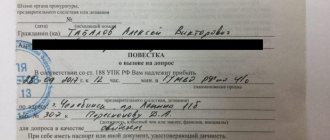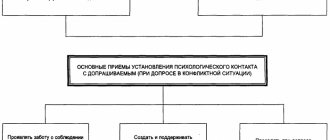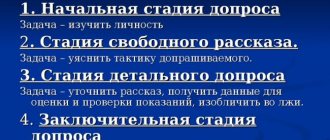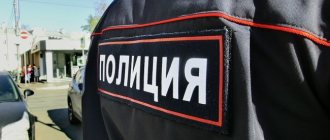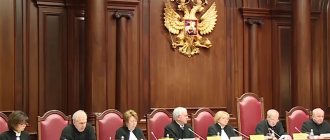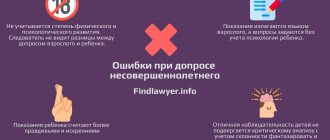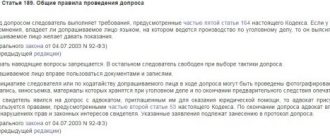A minor under 16 years of age can be summoned for questioning through his parents or educational institution. Notification of the interrogation may come in the form of a summons or by telephone. The agenda will display two names: the child's and the adult's.
If you believe that your child may be in danger, be sure to send him or her for questioning to a qualified defense lawyer - a juvenile defense lawyer.
Do you want to figure it out, but don’t have time to read the article? Lawyers will help
Entrust the task to professionals. Lawyers will complete the order at the cost you specify
63 lawyers on RTIGER.com can help with this issue
Solve the issue >
Who is eligible to attend?
The interrogation is carried out by investigative authorities in order to obtain oral information about the offense committed. Correctly constructing a conversation with a witness is not an easy task. The situation becomes more complicated if a minor citizen is interrogated. Children remember vivid details and moments well, but are not always able to verbalize information.
The basic rules for conducting interrogation at different stages of the investigation are explained in the Criminal Procedure Code of Russia:
- Art. 191 of the Code of Criminal Procedure of the Russian Federation - preliminary investigation;
- Art. 280 of the Code of Criminal Procedure of the Russian Federation - during a court hearing;
- Art. 425 of the Code of Criminal Procedure of the Russian Federation - interrogation of the accused, suspect.
An important condition is that the minor is summoned to the investigator through the child’s legal representatives, the list of which is contained in Article 5 of the Code of Criminal Procedure of the Russian Federation : parents; guardians (trustees); adoptive parents; orphanage administration. Representatives independently decide whether they will be present at the inquiry procedure.
When issuing a summons to appear, the investigator needs to analyze the advisability of inviting a specific legal representative. If there is a possibility that the actions of an adult infringe on the rights of a teenager, then a decision is made to replace the representative. What factors are considered:
- suspicion that the parents will persuade the child to give false testimony;
- victims of a sexual crime are ashamed to describe the details of what happened in front of their relatives;
- the presence of a loved one embarrasses the child, he is distracted, constantly waiting for the adult’s reaction to his words;
- the parents are suspected of abusing a minor or committing sexual molestation.
A teacher or psychologist must be present during the interrogation of a child under 14 years of age. If the teenager is between 14 and 18 years old, then a specialist is invited at the discretion of the investigator or judge. The exception is the psychological state of the person being interrogated: if a child suffers from a mental disorder or is developmentally delayed, then the presence of a psychologist is mandatory for any age.
How can a specialist help during interrogation? First of all, it is designed to establish contact with the teenager, as well as to suppress possible psychological pressure from the investigator or relatives. In addition, teachers provide consulting services regarding communication with minors in cases of sexual molestation.
The investigation may face the fact that the child lives independently, and his parents are deprived of parental rights. In this case, a representative of the local guardianship council must be invited to the interrogation. The inspector is obliged to ensure that the teenager’s rights are strictly observed.
Peculiarities of interrogation of minor suspects and accused during the preliminary investigation
The success of establishing the circumstances to be proven in criminal cases against minors largely depends on the skillful conduct of investigative actions, among which the central place is occupied by interrogation, which is one of the main means of obtaining evidence.
The effectiveness of interrogations is largely determined by strict adherence to procedural norms and the skilful use by the investigator (interrogator) of tactical techniques for carrying out this investigative action, especially when interrogating minors.
In criminal proceedings involving juvenile crimes, the general rules of interrogation are generally applied, however, in accordance with Art. 424, 425 of the Code of Criminal Procedure of the Russian Federation provides for a special procedure for summoning and interrogating a minor suspect or accused.
In accordance with Art. 424 of the Code of Criminal Procedure of the Russian Federation, a summons of a minor suspect, accused, who is not in custody, to the interrogating officer is carried out through his legal representatives, and if the minor is kept in a specialized institution for minors - through the administration of this institution.
The meaning of this norm is to really ensure, on the one hand, the right of a minor suspect accused to the presumption of innocence , to avoid harm caused to him due to unnecessary publicity of the fact of bringing him to criminal responsibility, and on the other hand, the right to the presence of parents (legal representatives ) at all stages of criminal proceedings in the interests of a minor.
At the same time, this summoning procedure obliges the legal representative or officials who are entrusted with the responsibility to ensure the proper behavior and appearance of the accused (suspect) who is not in custody to appear before the official conducting the proceedings in the case, and the minor himself - to participate in the execution of investigative and other procedural actions.
Requirements of Art. 424 of the Code of Criminal Procedure of the Russian Federation applies to minor suspects and accused persons who have not reached the age of eighteen at the time of the relevant procedural action, to persons performing the functions of a legal representative, as well as to the administration of specialized institutions in which a minor suspect (accused) is kept.
who is not in custody is summoned to the investigator by a summons, which indicates: to whom, for what case, at what address, on what day and time he must appear; the duty of the legal representative to ensure his appearance and the consequences of failure to appear without good reason by the accused or suspect himself (the use of procedural coercive measures provided for in Chapter 14 of the Code of Criminal Procedure of the Russian Federation, changing the preventive measure to a more severe one), as well as the legal representative, if he is summoned by the same subpoena.
The summons must be served directly on the persons listed in Art. 424 of the Code of Criminal Procedure of the Russian Federation, transferring it to other persons (as, for example, when calling a witness in accordance with Part 2 of Article 188 of the Code of Criminal Procedure of the Russian Federation) or to the minor suspect or accused without the knowledge of his legal representative is not allowed.
Carrying out investigative and other procedural actions with the participation of a minor suspect at night (from 10 p.m. to 6 a.m. local time) is not permitted, except in urgent cases (when the need for this is related to the urgency of conducting investigative actions to consolidate traces of the crime that has just been committed). crimes).
A summons to a minor suspect or accused held in a specialized institution for minors is carried out through the administration of this institution by summons or by means of communication (telephonogram, telegram, fax, e-mail, etc.).
The procedure for interrogating a minor suspect or accused is regulated by Art. 425 of the Code of Criminal Procedure of the Russian Federation and provides for a number of restrictions and additional conditions in comparison with the rules for interrogating an adult contained in Art. 46, 47, 76, 77, 164, 173-174, 187-190 Code of Criminal Procedure of the Russian Federation. Special procedural rules for the interrogation of a minor suspect or accused are established in order to maximally ensure the protection of the rights and legitimate interests of procedurally incompetent persons, including to protect the minor from unlawful actions of officials conducting the interrogation, as well as in order to ensure the reliability of testimony about the circumstances subject to proof, preserve the legal force of evidence obtained during interrogation and avoid the possibility of declaring it inadmissible. An important task of the law under consideration is also to create psychologically comfortable conditions for interrogation.
Procedural features of interrogation of a minor suspect or accused, provided for in Art. 425-426 of the Code of Criminal Procedure of the Russian Federation are as follows:
1. The interrogation of a minor suspect or accused cannot last more than 2 hours without a break, and in total more than 4 hours a day. In this case, the interrogation must be interrupted at any time if its continuation may threaten the life or health of the interrogated. The circumstances that served as the basis for termination of the interrogation must be certified in the interrogation protocol according to the rules established in Art. 167 Code of Criminal Procedure of the Russian Federation. If there are medical indications, the interrogating officer must determine the duration of the interrogation, guided by the doctor’s opinion (Article 187 of the Code of Criminal Procedure of the Russian Federation)
2. The participation of a defense lawyer in the interrogation of a minor suspect or accused is mandatory in accordance with the requirement of paragraph 2 of part 1 of Art. 51 Code of Criminal Procedure of the Russian Federation. The investigator is obliged to ensure the participation of a defense attorney on his own initiative, regardless of the will of the minor suspect or accused. His refusal of a defense lawyer is not mandatory for the investigator, the prosecutor and the court (Part 2 of Article 52 of the Code of Criminal Procedure of the Russian Federation). Testimony of a minor suspect or accused, given during interrogation at the stage of pre-trial proceedings in a criminal case in the absence of a defense lawyer, is considered inadmissible evidence, it has no legal force and cannot be used as the basis for an accusation, or used to prove any of the circumstances included as a subject of proof in the case (Article 73 of the Code of Criminal Procedure of the Russian Federation).
During the interrogation, the defense attorney has the right to ask the minor suspect or accused questions, and at the end of the interrogation, get acquainted with the protocol and make comments to be included in the protocol about the correctness and completeness of the entries made in it. In accordance with the provisions of Art. 166-167 of the Code of Criminal Procedure of the Russian Federation, the defense attorney is obliged to sign the protocol of interrogation of the suspect, the accused, and if the latter refuses to sign it or is unable to do so due to physical disabilities, as well as for health reasons, to certify the fact of refusal to sign or the impossibility of signing the protocol of interrogation of his signature.
3. An important feature of the interrogation of a minor suspect or accused, which directly affects the admissibility of the testimony obtained as evidence, is the participation of a teacher or psychologist.
The investigator is obliged to ensure the participation of a teacher or psychologist in the interrogation of a minor suspect, accused, under the age of sixteen, or who has reached this age, but suffers from a mental disorder or is lagging behind in mental development.
When participating in the interrogation of a minor accused or suspect, a teacher or psychologist does not replace a defense lawyer, but acts as a specialist. Its role is to use data from pedagogy or psychology in preparing, conducting interrogation and recording the testimony of the suspect. A teacher or psychologist is called upon to help create a normal interrogation environment, establish contact with a minor, pose correct questions from the point of view of pedagogy and psychology, and ensure that the testimony of the interrogated is recorded correctly and completely in the protocol.
For these purposes, a teacher or psychologist is vested with certain rights provided for in Part 5 of Art. 425 of the Code of Criminal Procedure of the Russian Federation, which must be explained to him before the interrogation begins:
- ask questions of a minor with the permission of the prosecutor, investigator, or interrogating officer (in this case, the interrogating officer must draw the attention of this specialist to the inadmissibility of asking leading questions);
- at the end of the interrogation, familiarize yourself with the protocol of testimony and make written comments about the correctness and completeness of the entries made in it.
In addition, the teacher or psychologist must draw his own conclusion about the correctness of the interrogation from the point of view of pedagogy and psychology.
On an explanation of these and other rights , as well as the duties of a specialist provided for in Art. 58 of the Code of Criminal Procedure of the Russian Federation, a corresponding note is made in the protocol, which is certified by the signature of a teacher or psychologist.
The reason for the participation of a teacher or psychologist in the interrogation of a minor suspect accused of the crimes specified in Part 3 of Art. 425 of the Code of Criminal Procedure of the Russian Federation in cases is the petition of the defense attorney or the initiative of the interrogating officer himself.
The law does not directly indicate in which cases a teacher is called to participate in the interrogation of juvenile suspects or accused, and in which - a psychologist. The decision on this is made at the discretion of the person conducting the interrogation. At the same time, it is important that the relevant teacher or psychologist has special knowledge in the field of child or youth psychology and has experience in teaching and educating minors of exactly this age and with precisely such deviations in mental health or mental development (for example, a teacher of general or specialized schools, defectologist, teacher of the deaf, etc.).
Determining the competence of a specialist in this case is especially important to ensure the admissibility of evidentiary information obtained during interrogation, since information about the teacher or psychologist who participated in the interrogation of a minor suspect accused during the preliminary investigation, as well as the results of his participation can be used by the parties and the court in interrogation and assessment of the testimony of a minor in court. Accordingly, during repeated and additional interrogations, it is advisable to ensure the participation of the same teacher or psychologist who participated in the first interrogation of the minor suspect or accused.
by Art . 71 of the Code of Criminal Procedure of the Russian Federation. Since persons interested in its outcome should not be involved in participation in criminal proceedings as a specialist, they cannot participate in the interrogation of a minor suspect or accused, for example, teachers responsible for his upbringing (class teacher, teacher, school director), therefore more so if they had conflicts with the minor or his parents. From a tactical point of view, it is also justified to invite a specialist who is not familiar to the minor to participate in the interrogation, whom he is less shy about and in whose presence he can be more frank.
In connection with these circumstances, before the start of the interrogation, the interrogator must familiarize the teacher or psychologist with the circumstances of the case that are relevant for the interrogation, find out whether there are reasons that prevent his participation in the interrogation, and explain the grounds and procedure for disqualifying the specialist.
4) In accordance with paragraphs. 2 and 3 hours 1 tbsp. 426 of the Code of Criminal Procedure of the Russian Federation , his legal representative also has the right to participate in the interrogation of a minor suspect or accused. Although this subject of the criminal process is not listed among the mandatory interrogation participants named in Art. 425, in connection with which the investigator is not obliged to ensure his participation in this investigative action in all cases, at the same time, no one can restrict the right of a legal representative to participate in the interrogation if he makes a request for this.
In this case , the legal representative of a minor suspect or accused has the right only to familiarize himself with the interrogation protocol and make written comments regarding the correctness and completeness of the entries made in it. The legal representative does not have the right to ask the interrogated person questions and demand that they be entered into the protocol. Like the defense attorney, he is obliged to sign the protocol of interrogation of the suspect or accused, and if the latter refuses to sign it or is unable to do so due to physical disabilities or health conditions, he must certify the fact of refusal to sign or the impossibility of signing the protocol of interrogation with his signature.
Similar features associated with the participation in investigative actions of a defender, teacher (psychologist) and legal representative also have the procedure for conducting confrontations and checking the testimony on the spot of a minor suspect, accused, victim and witness.
In addition, the defender of a minor suspect or accused must take part in all investigative and other procedural actions carried out with his client, fully exercising the powers granted by Art. 53 of the Code of Criminal Procedure of the Russian Federation. At the same time, the defense attorney may ask questions to the participants in the investigative action only with the permission of the interrogating officer; At the end of the investigative action, the defense attorney has the right to familiarize himself with the protocol and make comments to be included in the protocol regarding its additions and clarifications.
Unlike a defense attorney , the legal representative of a minor suspect or accused has the right, with the permission of the interrogating officer, to participate only in investigative actions carried out with the participation of the person represented and his defense attorney. The rights of the legal representative in this case are limited only to the opportunity to familiarize themselves with the protocols of the relevant investigative actions and make written comments on the correctness and completeness of the entries made in them.
The interrogation of a minor suspect and accused is due to the following specifics: less knowledge and life experience than adults; poor ability to concentrate; increased suggestibility; a tendency to mix the actually perceived and the imaginary; emotionality of judgments and actions.
The investigator must take these points into account when preparing for the interrogation of juvenile suspects and accused.
When preparing to interrogate a minor, it is necessary to obtain information about the identity of the accused. By the time charges are filed, parents, the class teacher, other teachers, and if the teenager works, then work colleagues must be questioned about this.
Detailed written characteristics from the place of study, work, residence, as well as from the commission and inspection for minors’ affairs should be attached
significantly in the Code of Criminal Procedure of the Russian Federation : its duration has been determined. Interrogation of a minor is limited to four hours per day, with a mandatory break after the first two hours of interrogation.
Mandatory participation in the interrogation of a defense lawyer is provided for, and his rights are also regulated within the framework of this investigative action. The participation of a teacher or psychologist in the interrogation of an accused (suspect) under the age of 16 or who has reached this age but suffers from a mental disorder or is lagging behind in mental development is recognized as mandatory. In addition, a legal representative has the right to participate in the interrogation.
An analysis of the updated rules for interrogation gave us the opportunity to justify proposals for changing the procedure for conducting interrogation:
a) it is necessary to establish a break of at least two hours during the interrogation of minor accused or suspects;
b) prohibit the interrogation of minor accused suspects at night;
c) it is advisable to clarify the procedure for involving a defense lawyer, psychologist, teacher, and legal representative in the interrogation of minor accused, suspects.
To summarize this paragraph, we note that, in our opinion, the following changes need to be made to the interrogation procedure:
1. It is necessary to exclude the simultaneous participation of a defense lawyer, teacher or psychologist, or legal representative in the interrogation.
2. Record the duration of the break during interrogation for at least two hours, even if the minor suspect or accused refuses to rest and eat.
3. Provide the minor accused with the right to choose a legal representative to participate in criminal proceedings.
4. When interrogating a minor accused, priority for participation in this investigative action must be given to the psychologist, and not to the teacher. At the same time, a psychologist, according to Yu.P. Mikhalchuk, with whom we agree, should be understood as a person who has a higher psychological education, with a specialization in the field of child, adolescent, youth psychology, and work experience in the specialty of at least 5 years [40] .
Receiving a call
It is prohibited to hand over a summons to appear for questioning to a teenager in person. His legal representatives or the administration of the institution where the child is being raised have the right to receive a summons.
The summons is addressed to the legal representative, while indicating the name of the minor. In exceptional situations, when a case of child abuse has been opened and it is undesirable to notify the parent, the summons is served on another person. For example, a grandmother or a teacher.
If a teenager is suspected of committing a crime and is taken into custody, a summons for questioning is sent to the head of the pre-trial detention center. Parents receive a separate summons indicating the place and time of the inquiry. They have the right to appear in the investigator's office to attend the procedure.
How to summon a minor
The teenager can be summoned by employees of the investigative agency or the court. To do this, a summons is sent to the address of the legal representatives of the child or the institution where he is kept (orphanage, etc.).
The agenda must contain the following information:
- information about who is calling for questioning (name, position, etc.);
- in what capacity the teenager is called;
- time and date when you should see the investigator.
In order to ensure the appearance of a teenager, the investigator has the right to come to the home address of the child and his parents or call them by phone and inform them of the need to appear for questioning. In this case, it is up to them to decide whether there is a need to receive the summons itself.
The subpoena can also be served through the local police officer.
If you received a summons by registered mail, then you need to go to the investigator as soon as possible, since the postman can sign for you upon receipt. To prevent you or your child from being accused of failure to appear, it is better not to delay it.
Location
Art. 187 of the Code of Criminal Procedure of the Russian Federation says that the inquiry is carried out at the place of the preliminary investigation or at the location of the witness. It is advisable to conduct a conversation with a child in a familiar environment. For example, in a school office or at home. In a familiar environment, children feel much more comfortable and make contact better.
Minors 14-18 years old are called into the investigator’s office, because in this way the importance of the procedure is emphasized. An official setting encourages a teenager to give truthful information.
Duration of interrogation
The law does not stipulate the question of at what age it is permitted to involve children in investigations. Of course, if a witness or victim is a child who has not yet learned to speak, then there can be no question of interrogation. Regarding children 3-4 years old, the investigator makes a decision individually. Basically, authorized bodies try to find older witnesses to a crime.
The carrying out of investigative actions cannot exceed:
- if the child is under 7 years old - half an hour without a break;
- from 7 to 14 years - 1 hour without a break, total time - 2 hours a day;
- from 14 to 16 years old - 2 hours without a break, total time - 4 hours a day.
The interrogation must be carried out “hot on the heels”, because children are very impressionable. New events quickly overshadow everything experienced before. Especially if the incident did not cause a sharp outburst of emotions in the child. The investigator, sometimes with the help of a psychologist, draws up a conversation plan and formulates unambiguous, understandable questions.
Interrogation of minor children in court
During the trial, the court must re-interrogate the teenager, without relying on the information that was obtained as a result of the investigation (along with the video recording obtained).
Depending on the situation, the court has the right to determine the obligation for the personal presence of the child and his parents at the meeting (or some meetings) in order to ask them certain questions or know their opinion on certain facts.
The questioning of a witness or victim in court who is over 14 years old must be done extremely delicately. After all, we are talking about an official setting, a huge number of people, the personal presence of the defendant, who can also ask questions. Therefore, all questions are asked in a calm tone, without any moral pressure on the child , otherwise he will become withdrawn.
It is considered acceptable to interrogate a minor via video link from a neighboring room or building. This method is aimed at “relaxing” the minor victim in order to obtain more objective testimony.
As for the duration of the judicial interrogation, the norms specified in the pre-trial procedure are taken into account (up to 2 hours). But remember that the duration of the break is not established by the legislator and, if necessary, be sure to use it.
Conducting an interrogation
Investigative actions begin with the investigator drawing up a resolution indicating the circumstances of the crime and the status of the child. For example, a victim in a criminal case. At the same time, a decision is made to appoint a legal representative who will accompany the minor during all investigative activities.
Interrogating a teenager is no different from a similar procedure with adults. The only peculiarity is that children under 16 years of age are not warned about liability for giving false information, as well as for refusing to testify ( Part 2 of Article 191 of the Code of Criminal Procedure of the Russian Federation ). The investigator simply points out the need to tell the truth.
Procedure for conducting an inquiry:
- clarification of the rights of the person being interrogated;
- recording the data of those present in the protocol;
- the minor tells his vision of events;
- the investigator asks questions;
- the interrogation participants sign the protocol (if the child is very young, then the signature of his legal representative is sufficient).
The law obliges investigators to videotape the interrogation. Subsequently, the video materials are added to the case materials. It will be possible to resort to them during further proceedings in court. However, the child himself or his legal representative has the right to refuse video recording of the inquiry. This must be noted in the protocol.
Rights of representatives
The interrogation of a minor suspect, according to the Code of Criminal Procedure of the Russian Federation, must be carried out in the presence of a legal representative, who is allowed to participate in the case after the interrogator makes a corresponding decision.
In accordance with Part 2 of Art. 426 of the Code of Criminal Procedure of the Russian Federation, representatives are explained their rights, in particular:
- get acquainted with the charge and attend its presentation;
- attend interrogations and other actions if permission from the interrogating officer is obtained;
- get acquainted with the protocols, make written comments;
- file a petition about violations committed during the investigation;
- present evidence in defense of the minor;
- get acquainted with the case materials after the end of the investigation.
The investigator has the right to restrict minors from familiarizing themselves with case materials that contain information that can harm their mental state. The legal representative of the minor suspect may have access to all materials, regardless of their content.
Confidentiality of information
The Criminal Code of the Russian Federation prohibits the dissemination of information about children who have suffered as a result of a crime. The ban applies to any information: personal data, photographs, video materials, voice recordings. It is especially important to maintain confidentiality when a minor has been the victim of sexual assault. By introducing such restrictions, legislators pursued one goal - to protect the child from attacks from the environment and ridicule of peers.
Failure to comply with the ban entails serious consequences: from a fine (150-350 thousand rubles) to imprisonment for a period of 5 years. According to Part 3 of Article 137 of the Criminal Code of the Russian Federation, public speaking or publication of facts in the media can serve as illegal dissemination of information.
Interrogation in a criminal case
The law allows not to re-examine a minor witness. Basically, judges conduct proceedings based on materials collected by the investigator. Such norms are completely justified: in the courtroom, in addition to many strangers, there is a defendant.
If the court decides to re-interrogate, then the attendance of the child’s legal representative at the hearing is mandatory. Adult participants in the process must create a calm environment. The duration of the process does not exceed the time established by Art. 191 Code of Criminal Procedure of the Russian Federation . Usually the judge allows no more than an hour for interrogation, so as not to cause psychological trauma to the child.
Basic moments:
- A psychologist is invited to the meeting if the person being interrogated is under 14 years old or suffers from a psychological disorder;
- the psychologist has the right to ask questions adapted to the age and condition of the child;
- a teenager over 16 years of age is explained his responsibility for giving false information or concealing facts.
The court has the right to remove the defendant from the courtroom during the investigation. Such a measure is formalized by an appropriate resolution indicating the reason for removal: the psychological state of the child, violence committed in the past. The bailiffs return the defendant to the hearing as soon as the interrogated person leaves the courtroom.
Main conclusions
- The role of a witness is a person who has some information about what happened and can convey it in detail to the investigation.
- The interrogation of a minor in court and in the investigator's office can last no more than 2 hours a day. There is a mandatory break after every hour.
- The interrogation of a minor witness, victim or suspect is carried out in the presence of a psychologist, teacher or legal representative.
- It is necessary to invite a child for questioning only if it is impossible to find out all the circumstances of the case without obtaining information that the child has.
- Before starting the interrogation, the investigator must explain the reason for the meeting to the teenager and his legal representative, and indicate their rights and responsibilities.
During the judicial interrogation of a child, the judge has the right to ask the defendant to temporarily leave the courtroom if his presence disrupts the calm atmosphere for the minor witness or victim.
Interrogation in a civil case
The conversation is conducted with the child not only about criminal offenses. Often the child's opinion is important in civil proceedings. The legislation does not limit the age of children interrogated. But judges involve minor witnesses, mainly in cases of a family nature: deprivation of parental rights, adoption, living with one of the parents after a divorce. But even in such situations, they try to use other evidence.
Basic moments:
- A conversation with a minor under 14 years of age must be carried out in the presence of a teacher or educator ( Article 25.6 of the Code of Administrative Offenses of the Russian Federation ). The specialist must have teaching experience and education. The teacher monitors the child’s condition during the interrogation, adapts questions to his perception, and explains the characteristics of his behavior.
- Questions and answers must be included in the minutes.
- Any of the participants may be removed by the court during the interrogation.
Children under 16 years of age have the right to leave the court hearing after the end of the interrogation. Of course, accompanied by a legal representative. In rare cases, it may be necessary to clarify some details, then the minor remains in the courtroom until the end of the process.
Summons for interrogation
When a minor citizen takes part in investigative actions, then he will be invited to interrogation through a legal representative. Therefore, the summons is sent to the parents: the order will indicate the first and last names of the parents, as well as the first and last names of the child. Sometimes a summons is sent to the director of the educational institution where the child is studying, and this is acceptable.
Important! If the minor witness or accused is an orphan and studying in a boarding school, then a representative of the educational institution will also be summoned for questioning.
The role of legal representative is:
- the child's natural parents;
- foster parents who adopted a teenager;
- guardians;
- trustees;
- representatives of the institutions where the child is studying (orphanage workers).
You might be interested in:
Criminal law
Exemption from criminal liability under Article 286 of the Criminal Code in connection with reconciliation
Read more
Criminal law
The Supreme Court clarified what is meant by “sincere repentance”
Read more
Criminal law
The procedure for granting visits in a pre-trial detention center is illegal!
Read more
Criminal law
The essence of house arrest
Read more
Criminal law
If they extort money
Read more
Criminal law
The heat of passion
Read more
In practice, situations often occur when a child does not study in any educational institution, and his parents have been deprived of parental rights. As a result, there is no adult who could represent the interests of the minor. In this case, when the investigator asks the child questions, guardianship or guardianship authorities may be present.
Sometimes a subpoena may be sent not to the parents , but to the grandparents, teachers, or sports coaches. This happens in a situation where the parent should not know about the case (for example, the parent is a suspect in the case or negatively influences the upbringing of the teenager) (Chapter 11 of the code).
There are also other “extra” situations when a child can be summoned for questioning without first informing the legal representative: if an 18-year-old child has already been chosen as a preventive measure in the form of staying in a pre-trial detention center. In this case, the procedure is as follows:
- parents receive a subpoena requesting their personal presence during the interrogation;
- The head of the pre-trial detention center receives a document demanding that the arrested person be taken to the interrogation room. Such a subject must also be provided with legal protection in the person of a lawyer. (Our juvenile mediator lawyer is ideal for such actions)


